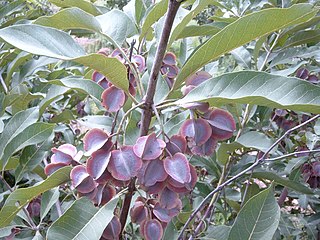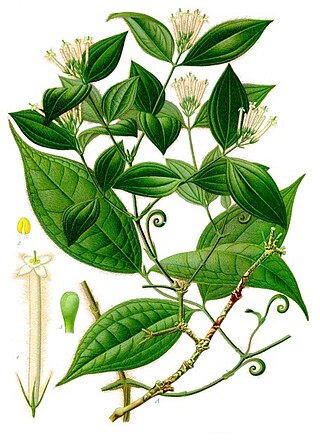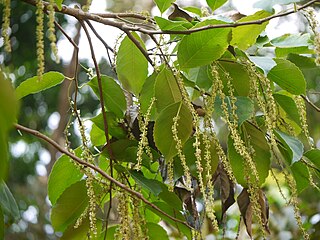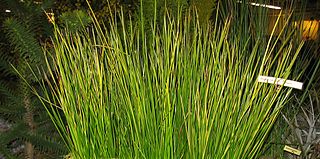
Combretum, the bushwillows or combretums, make up the type genus of the family Combretaceae. The genus comprises about 272 species of trees and shrubs, most of which are native to tropical and southern Africa, about 5 to Madagascar, but there are others that are native to tropical Asia, New Guinea and the Bismarck Archipelago, Australia, and tropical America. Though somewhat reminiscent of willows (Salix) in their habitus, they are not particularly close relatives of these.

Strychnos is a genus of flowering plants, belonging to the family Loganiaceae. The genus includes about 100 accepted species of trees and lianas, and more than 200 that are as yet unresolved. The genus is widely distributed around the world's tropics and is noted for the presence of poisonous indole alkaloids in the roots, stems and leaves of various species. Among these alkaloids are the well-known and virulent poisons strychnine and curare.

Ochna is a genus comprising 79 species of evergreen trees, shrubs and shrublets belonging to the flowering plant family Ochnaceae. These species are native to tropical woodlands of Africa, Madagascar, the Mascarenes and Asia. Species of this genus are usually called ochnas, bird's-eye bushes or Mickey-mouse plants, a name derived from the shape of the drupelet fruit. The name of this genus comes from the Greek word ὄχνη (ókhnē), used by Theocritus and meaning "wild pear", as the leaves are similar in appearance. Some species, including Ochna integerrima and O. serrulata, are cultivated as decorative plants.

Campylospermum is a genus of flowering plants in the family Ochnaceae. It includes 55 species native to tropical Africa, India, Indochina, Hainan, and western Malesia.

Homalium is a genus of plants in the family Salicaceae.
Memecylon dasyanthum is a species of plant in the family Melastomataceae. It is endemic to Cameroon. Its natural habitat is subtropical or tropical moist montane forests. It is threatened by habitat loss.

Baumea is a genus of the sedge family, which includes around 30 species native to Madagascar and the Pacific Islands, with 15 species in Australia. All are perennial rhizomatous herbs, with leaves and stems very similar in appearance. The inflorescence is terminal, with the flowers tightly clustered or loosely arranged. The fruits are small nuts.
Elvasia is a Neotropical genus of plants in the family Ochnaceae. It includes 14 species native to the tropical Americas, ranging from Belize to Bolivia and southeastern Brazil.
Calvoa is a genus of flowering plants belonging to the family Melastomataceae.

Chytranthus is a genus of flowering plants belonging to the family Sapindaceae. It includes 32 species of small trees and shrubs native to tropical Africa, ranging from Guinea eastwards to Kenya and Tanzania and south to Angola. Most species have a palm-like habit, with large pinnate leaves and unbranched trunks.
Craterosiphon is a genus of flowering plants belonging to the family Thymelaeaceae.
Deinbollia is a genus of flowering plants belonging to the family Sapindaceae.
Dicranolepis is a genus of flowering plants belonging to the family Thymelaeaceae.
Eriocoelum is a genus of flowering plants belonging to the family Sapindaceae.
Lasiosiphon is a genus of flowering plants belonging to the family Thymelaeaceae.
Pancovia is a genus of flowering plants belonging to the family Sapindaceae.
Peponium is a genus of flowering plants belonging to the family Cucurbitaceae.
Dissotidendron is a genus of flowering plants belonging to the family Melastomataceae.

Buchnera is a genus of flowering plants belonging to the family Orobanchaceae. Its native range is Northern and Tropical America, Tropical and Southern Africa, Madagascar, Arabian Peninsula Tropical Asia, Australia.







